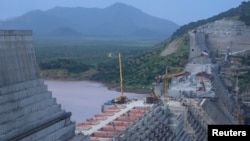Egypt is blaming Ethiopia for the failure of the latest round of talks on the construction of a controversial Nile dam, a critical issue for Cairo as it seeks to protect its main source of freshwater for its large and growing population.
The construction of the $4.6 billion Grand Ethiopian Renaissance Dam on the Blue Nile, which is around 70% complete and promises to provide much-needed electricity to Ethiopia's 100 million people, has been a contentious point among Ethiopia, Sudan and Egypt, the three main Nile Basin countries.
On Thursday, officials from the three countries concluded a two-day meeting in the Ethiopian capital, Addis Ababa, without reaching an agreement on technical issues related to the dam's construction.
The Blue Nile flows from Ethiopia into Sudan where it joins the White Nile near the capital, Khartoum, to form the Nile River. Eighty-five percent of Nile waters originate in Ethiopia from the Blue Nile, which is one of the Nile's two main tributaries.
Egypt's Irrigation Ministry, in a statement released late on Thursday, said that despite its delegation's attempts to "narrow differences'' among the three countries, the Ethiopian government failed to prove that it would take all necessary precautions to ensure that its dam will not affect Egypt's water supply, especially in times of drought.
Earlier, Ethiopian Minister for Water and Energy Sileshi Bekele told reporters that the Egyptian delegation "was in no spirit of reaching an agreement'' during this last round of talks. He added that his government would not accept an Egyptian suggestion to extend the time to fill up the dam from 12 to 21 years. He said Ethiopia would start filling the dam in July 2020, at the start of its rainy season.
Months of meetings have so far failed to yield consensus, including on a timetable for filling the reservoir. Egypt fears the project, set to be Africa's largest hydraulic dam, could reduce its share of the Nile, a lifeline for Egypt's 100 million people.
Ministers from the three countries are now expected to meet in Washington D.C. on Monday to report on the progress they made so far. The United States and The World Bank observers are expected to attend the talks.
Last year, Egyptian President Abdel Fattah el-Sissi had pleaded to the United States and the international community to mediate a solution to the ongoing Nile dispute. Foreign ministers of the three Nile Basin countries had met in Washington D.C. in November and agreed to resolve the matter by mid-January.
Egypt Blames Ethiopia for Latest Failure of Nile Dam Talks









